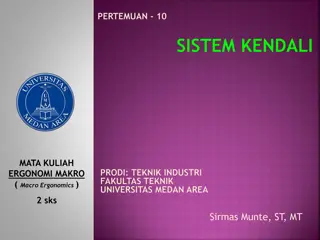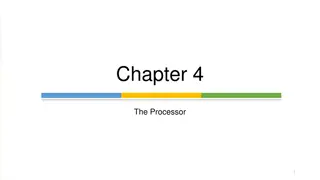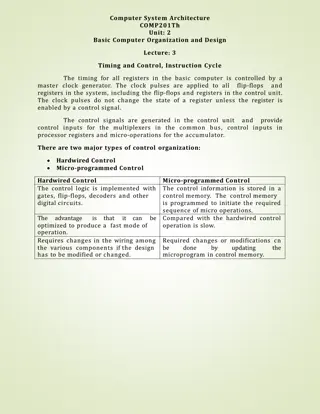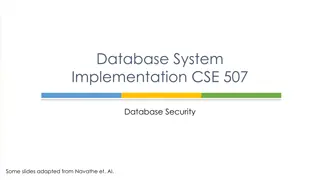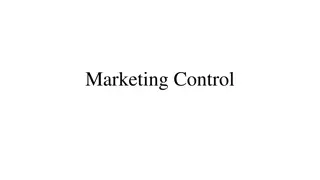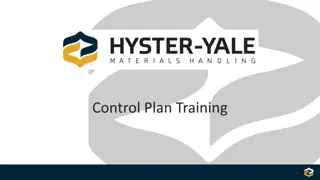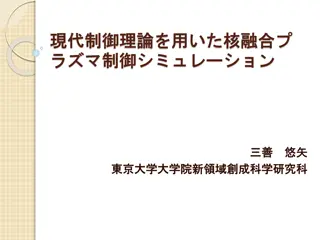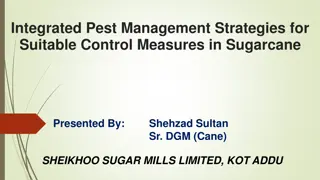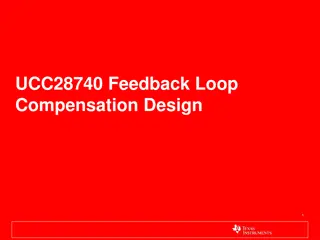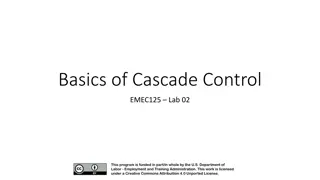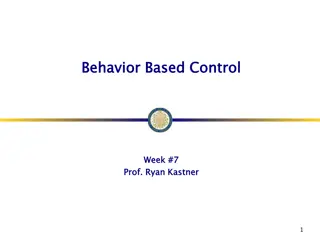
Exploring Control Variables for Organization Design
This paper delves into various control variables crucial for effective organization design, encompassing reward structure, task characteristics, information systems, theoretical integration, and more. It discusses the significance of outcome-based control, behavioral control, and addresses challenges in agency problems. Insights from prominent theories and empirical studies are woven together to emphasize the importance of organizational control strategies.
Download Presentation

Please find below an Image/Link to download the presentation.
The content on the website is provided AS IS for your information and personal use only. It may not be sold, licensed, or shared on other websites without obtaining consent from the author. If you encounter any issues during the download, it is possible that the publisher has removed the file from their server.
You are allowed to download the files provided on this website for personal or commercial use, subject to the condition that they are used lawfully. All files are the property of their respective owners.
The content on the website is provided AS IS for your information and personal use only. It may not be sold, licensed, or shared on other websites without obtaining consent from the author.
E N D
Presentation Transcript
Company LOGO Control: Organizational and Economic Approaches Kathleen M. Eisenhardt Department of Industrial Engineering and Engineering management, Stanford University Presenter: Wen Zheng
Contents Introduction Theory Empirical Discussion Conclusion
This paper want to explore control variables for organization design Introduction Theory Empirical Discussion Conclusion
This paper want to explore control variables for organization design Introduction Reward structure Task characteristics Information system Theory Empirical Discussion Conclusion
This paper want to explore control variables for organization design Introduction Reward structure Task characteristics Information system Theory Empirical Discussion Organization design often focus on structure solution. Conclusion
This paper want to explore control variables for organization design Introduction Theory Theoretical Integration Empirical Test Empirical Discussion Conclusion
Thompson(1967) Ouchi (1979) Behavioral based control Performance Evaluation Control Introduction Information Characteristics Theory Outcome based control Control Strategy Empirical Social or people based Control Discussion Task Programmability Conclusion Outcome measurability
Introduction Task Perfect Imperfect Outcome Theory Behavior or outcome control Empirical High Outcome control Discussion Socialization Clan control Low Behavior control Conclusion Adapted from Ouchi (1979)
Determine the optimal contract for the Agent Services Agency Problem Introduction Complete Information Incomplete information Theory Empirical Discussion Outcome Control Behavior Control Conclusion Assumptions: -Uncertain outcome and risk averse agent -Effort averse agent -Risk sharing -Outcome measurement -Behavior measurement
Concerned with determinants of control strategy Introduction Theory Rational Empirical Efficiency oriented Discussion Information based Conclusion Distinguish between behavior and outcome based control
O A Introduction Compare ability to measure behaviors Compare costs of behavior control and outcome control Cost Theory Control is a measurement, evaluation, and reward process Control is a measurement and evaluation process Reward Empirical Social or People Control Assume divergent performances for effort of workforce Possible to reduce divergent preferences through social control Discussion Conclusion Task characteristics determine the information available Role of Information Information is a purchasable commodity Control determined by measurement and risk bearing issues Control determined by measurement issue Uncertainty
Introduction Task Characteristics -Task Programmability Theory Control Strategy -Behavior based -outcome based Information System -Behavior Measurement -Outcome Measurement Empirical Discussion Uncertainty Conclusion
Introduction Task Characteristics -Task Programmability Theory Control Strategy -Behavior based -outcome based Information System -Behavior Measurement -Outcome Measurement Empirical Discussion Uncertainty Conclusion
Introduction Task Characteristics -Task Programmability Theory Control Strategy -Behavior based -outcome based Information System -Behavior Measurement -Outcome Measurement Empirical Discussion Uncertainty Conclusion
Introduction Task Characteristics -Task Programmability Theory Control Strategy -Behavior based -outcome based Information System -Behavior Measurement -Outcome Measurement Empirical Discussion Uncertainty Conclusion
Sample: 95 specialty stores in a Suburban Bay Area shopping center Introduction Theory Empirical Discussion Conclusion
Sample: 95 specialty stores in a Suburban Bay Area shopping center Introduction Theory Definition: Stores with less than 8,000 square feet of selling space Characteristics: Size, turnover, promotion Reason: Provide a relative large number of comparable organizations which are conveniently located Provide a setting in which a normative and efficiency model should be descriptively accurate Social or people control is not relevant Empirical Discussion Conclusion
Task Programmability Introduction Behavior Measurement Theory Outcome Uncertainty Empirical Discussion Cost of outcome Measurement Conclusion Control Alternative Explanations
Preliminary interview Task Programmability The amount of service in selling process. (less programmable) Service Product Selling time Training time Introduction Behavior Measurement Theory Outcome Uncertainty Empirical Discussion Cost of outcome Measurement Conclusion Control Alternative Explanations
Task Programmability Preliminary interview Introduction Physical limitations on observation of salespeople by management Selling Space Square footage of the store Total number of store employees Number of salespeople per store supervisor (managers, assistant managers Behavior Measurement Theory Outcome Uncertainty Empirical Discussion Cost of outcome Measurement Conclusion Control Alternative Explanations
Task Programmability Secondary source Introduction Three measures Number of competitors in the San Francisco SMSA by merchandise category. Failure rates in 1975 by merchandise category Failure rates in 1979 by merchandise category Behavior Measurement Theory Outcome Uncertainty Empirical Discussion Cost of outcome Measurement Conclusion Control Alternative Explanations
Task Programmability Introduction Behavior Measurement Theory Outcome Uncertainty Empirical Depend on the cost of the outcome measurement system. The number of stores in the store chain. The dichotomous ownership variable Discussion Cost of outcome Measurement Conclusion Control Alternative Explanations
Task Programmability Introduction Behavior Measurement Theory Outcome Uncertainty Empirical Discussion Cost of outcome Measurement Behavior based vs. outcome based reward structures. Outcome based: Commission, commission against law and salary plus commission Behavior based: Salary or hourly rate compensation Conclusion Control Alternative Explanations
Task Programmability Introduction Behavior Measurement Theory Outcome Uncertainty Empirical Discussion Cost of outcome Measurement Conclusion Control Talbert and Bose (1978) Sex composition Price Type (specialty vs. department) Location (city vs. suburbs) Alternative Explanations
Construct Internal Consistency 0.72 Convergent validity 0.33-0.54** Discriminant validity 4 of 96 Task Programmability Behavior Measurement Outcome Uncertainty Cost of Outcome Measurement Introduction 0.82 0.49-0.65*** 0 of 54 Theory Empirical 0.82 0.52-0.76** 0 of 54 Discussion 0.75 0.6** 0 of 20 Conclusion Note: 1. Measured by Standardized Cronbach Alpha 2. Measured by Range of correlations 3. Measured by # cross construct correlations>within correlations construct 4. Significant level: * 0.1 **0.05 ***0.01
Correlation Matrix Introduction Theory Empirical Discriminant Analysis Discussion Conclusion
Discriminant Analysis Classification Table (N=54) Introduction Theory Empirical Discussion Conclusion
Humanist/attributionist argument that salient extrinsic reward diminishes intrinsic motivation should be used cautiously outside of the experimental laboratory. Introduction Theory Empirical Responsibility need not match controllability. Discussion Conclusion
Job Design----Simple and Routine job Introduction Invest in information System Theory Outcomes based control---Simple evaluation scheme, a flexible job content Empirical Discussion Employ people whose preference coincide with those of management----selection, training and socialization Conclusion
Company LOGO Thank You !



